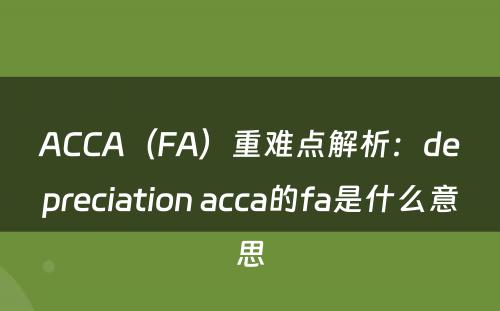ACCA(FA)重难点解析:depreciation acca的fa是什么意思

ACCA(FA)重难点解析:depreciation

在ACCA考试中,FA科目里depreciation是一个高频的计算类考点,并且折旧的计算也是同学们必须要掌握牢的知识点,对此,小编今天就跟大家详解depreciation这个考点内容。
01、折旧的定义?
折旧depreciation是指在固定资产使用寿命内,按照确定的方法对应计折旧额进行系统分摊。
折旧反映了固定资产non-current asset由于使用而逐渐损耗的价值。折旧的金额符合会计上的“配比”原则,与固定资产在使用期间产生的经济利益相配比。
02、折旧的范围?
在FA的考试中,企业应对所有固定资产计提折旧,但land土地由于预计使用年限不确定除外。
03、折旧的起讫时间?
企业购买固定资产可能在一年的年初,也可能在年中,这时折旧的计算就会涉及到两种时间基础。
一是按月计提折旧(monthly pro- rata basis或charged proportionately in the year of purchase and disposal),按月为分配单位把每个月的折旧相加计算出全年的折旧;
二是按全年计提折旧(full year basis),题目往往会描述成——charge a full year’s depreciation in the year it is purchased and no depreciation in the year it is disposed of,指在购买当年全年计提折旧,而在处置当年不考虑折旧。另外需要注意已经提足折旧但仍在继续使用的固定资产不再继续计提depreciation。
04、影响固定资产折旧的因素?
影响折旧额的因素有以下几类:
(1)cost,固定资产的原值
(2)预计净残值,scrap value,在FA的考试中题目往往会提前告知
(3)使用寿命,useful life
(4)固定资产折旧方法,在FA的考试中仅考查直线法straight line method和余额递减法reducing balance method
(5)折旧率:depreciation rate
05、固定资产折旧方法
接下来,我们来详细介绍在直线法和余额递减法两类不同折旧方法下折旧额的计算。
(1)直线法straight line method:The straight line method provided that it is reasonable to assume that the business enjoys equal benefits from the use of the asst in every period throughout its life,直线法下假设资产给企业带来的经济收益在每年都是平均的,按照固定资产成本的百分比(折旧率)来计提每年的折旧。
直线法下每年的折旧金额是一样的,计算公式=(cost-scrap value)/estimated useful life。
在考试中,题目往往会给出直线法下的折旧率X%,这里的X%=annual depreciation amount/(cost-scrap value)。
例如,a non-current asset costing $20000 with an expected residual value of nil and an expected useful life of 10 years.
The depreciation charge per annually is 10% of cost.
注意:这里的10%并不是余额递减法下的折旧率,而是1/10(预计使用寿命)得到的10%。
例题:
Wilson bought a machine on 1 January 20X5 for $130000. The machine was depreciated at 20% on a straight line basis with proportional charge in the year of acquisition and disposal.
On 1 April 20X8 Wilson sold the machine and made a loss on disposal of $6300.
What were the disposal proceeds that Wilson received for the machine?
答案:39200
解析:
解题关键词:直线法计提折旧;按月计提折旧。
固定资产从1 January 20X5持有至1 April 20X8,经过了3年3个月,题目要求按月计提折旧,在处置当天1 April 20X8:
Carrying amount=$130000-($130000*20%*3+$130000*20%*3/12)=$45500.
Loss on disposal=disposal proceeds - carrying amount=-$6300=disposal proceeds-$45500.
Proceeds=$39200.
(2)余额递减法 reducing balance method:The reducing balance method based on the assumption that the benefits obtained by the business from using the asset decline over time.余额递减法假设资产为企业带来的经济收益不是平均的,在购买的早期资产带来的经济利益大,而在后期,随着资产的逐步消耗,资产为企业带来的收益缓慢减少。
余额递减法在每年年初按照成本减去累计折旧的余额的百分比(折旧率)来计提折旧。
计算公式depreciation=(cost-accumulated depreciation)*X%。
余额递减法下的depreciation charge as X% of the carrying amount of asset,余额递减法下的折旧等于资产在期初的账面价值乘一个固定的折旧率,这个比率往往会由题目给出,注意在余额递减法下每年的折旧金额计算不考虑残值,最后一年除外(最后一年的折旧金额采用倒挤的方式,已知最后一年的期初资产账面价值和资产的残值,倒推最后一年的depreciation=期初账面价值-残值)。
例题:
A company bought an asset on 20X4/1/1 for 400000. Depreciation was charged on a reducing basis at 20%. On 20X7/1/1, the asst is revalued to market value of 520000.
How much should be recorded in the revaluation reserve at 20X7/1/1?
答案:315200
解析:
解题关键词:余额递减法计提折旧。
X4/1/1-X5/1/1:
deprecation=400000*20%=80000,carrying value=320000;
X5/1/1-X6/1/1:
depreciation=320000*20%=64000,carrying value=256000;
X6/1/1-X7/1/1:
depreciation=256000*20%=51200,carrying value=204800.
Revaluation surplus=520000-204800=315200.
注意:余额递减法下,折旧率保持不变,而基数随着累计折旧的不断增加,变得越来越小,导致后期的折旧费用变小。
考点延伸:
在真实的FA考试环境中,除了单考折旧计算以外,题目也会结合固定资产入账价值cost(作为折旧计提的基础),重估增值以及PPE的movement公式进行综合考察。我们要着重留意以下几点:
(1)资产重估时,累计折旧账户清零,重估后第一年的累计折旧就是该年度的折旧费用。
(2)固定资产的初始计量,即折旧公式中的cost,主要包含:资产买价,相关法律费用,工程师费用,装卸费及其他使固定资产达到可使用状态所必须发生的费用。
(3)计提折旧要从固定资产到达预定可使用状态的时间点开始。
(4)Transfer excess depreciation to retained earnings(将重估后每年多计提的折旧转入留存收益)是企业可以选择的政策,不是强制的。
除标明原创以外的内容,其他源于网络,请以官方为准。如有侵权:yimgjqzd@qq.com 或者【 点击提交 】第一时间进行删除!







